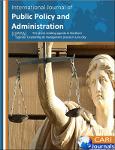The street vending agenda in Northern Uganda: Examining its management praxis in Lira city
Abstract
Purpose: This study aimed to determine the quality of street vending management in Lira City; specifically focussing on the quality of planning for street vending, the level of organization for street vending, coordination of street vending, and the quality of control for street venting.
Methodology: A qualitative approach was adopted and a sample of 100 respondents was realised. The Interview Guide and the Documentary review were used for data collection. Content validity was tested using a research expert’s opinion, the research supervisor. To test the reliability, a test-retest technique was employed in which questionnaires were administered to a group of street vendors with similar characteristics as the actual sample size but not included in the final study.
Findings: The study reveals that Management of street vending in Lira City had a poor control mechanism given that street vending has no identity in the City. Also, the design for the main Market was not favourable for vending since other lockups were hidden away from customers’ easy access. The city authorities gave Stools and Lockups to some vendors who were not active but street vending continues to support members to pay school fees for their children, improving the standard of living, providing employment to the unemployed men and women and they request to be allowed to continue with the vending. On the whole, street vending lacks clear planning, organisation, coordination and control in lira city.
Contribution to theory, practice and policy: It is concluded that the success of street vending in lira city will continue to depend on how well it is planned, organised, coordinated and controlled by the stakeholders. The study recommends that Lira City should employ four in one management strategies which are planning, Organising, Coordinating and Controlling (POCC); the city should zone all the business where each business is done in specific area so that for one to buy an item, such a person must go and find such a commodity in a specific place gazetted for it, but not anywhere as it is being done; and, it should come out with the uniform rates for renting a lockup or stool constructed by the government or constructed on government land. This study contributes to the understanding of the numerous urban dynamics surrounding the informal business operations and management for a cleaner and well-organised city
Collections
- Research Articles [139]

